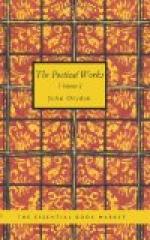—Totamque infusa per
artus
Mens agitat molem, et magno so corpore
miscet.
We behold him embellishing his images, as he makes Venus breathing beauty upon her son AEneas.
—lumenque juventae
Purpureum, et laetos oculis afflarat honores:
Quale manus addunt ebori decus, aut ubi
flavo
Argentum Pariusve lapis circundatur auro.
See his Tempest, his Funeral Sports, his Combat of Turnus and AEneas: and in his Georgics, which I esteem the divinest part of all his writings, the Plague, the Country, the Battle of the Bulls, the Labour of the Bees, and those many other excellent images of nature, most of which are neither great in themselves, nor have any natural ornament to bear them up: but the words wherewith he describes them are so excellent that it might be well applied to him, which was said by Ovid, Materiam superabat opus: the very sound of his words has often somewhat that is connatural to the subject; and while we read him, we sit, as in a play, beholding the scenes of what he represents. To perform this, he made frequent use of tropes, which you know change the nature of a known word, by applying it to some other signification; and this is it which Horace means in his epistle to the Pisos:
Dixeris egregie, notum si callida verbum
Reddiderit junctura novum—




